(完整版)一般疑问句PPT
合集下载
一般疑问句ppt课件

Do you like oranges?
5.I like to eat cakes. Do you like to eat cakes?
最新版整理ppt
11
肯定句变一般疑问句: 1.先找be动词,如果有,就把be动词提前。 2.找情态动词can,如果有,就把can提前。 3.用助动词do,把do提前。 4.找have got/has got,如果有,就把have/has提前,
2.That is a peach.
This is not a peach.
3.I am five years old.
I am not five years old. 4.He is my brother.(弟弟)
It is not my brother.
5.She is a teacher.
She is not a teacher.
feel _______________
_______________
_______________
/teist/
_______________
taste _______________
_______________ _______________
最新版整理ppt
23
All kinds of fruit
watermelon grape
melon
lemon
This is a …
Touch it. It’s …,I think. plum Smell it. It’s …, I think.
Taste it. It’s …, I think.
I like …very much.
cherry
strawberry
小学英语语法---一般疑问句和特殊疑问句ppt课件

可编辑课件
4
e.g
This is Amy's bike.(一般疑问句)
Is this Amy's bike?
Yes, this is. (肯定回答)错误
No, this isn‘t. (否定回答)错误
Did you go to Beijing last weekend?
Yes, I did. (肯定回答)
2、如句子里是动词就在这些词前加 don't,doesn't,didn't
(1)主语是第一、二人称(复数)加don’t,第三人称单数加
doesn't
(2)如果是过去式就加didn't
例:I like dogs.
She likes swimming.
I don‘t like dogs.
She doesn’t like swimming.
No, I didn't. (否定回答)
I have some books. (一般疑问句)
Do you have any b可o编辑o课件ks?
5
变否定句的做法:
1、如句子里是be动词:am,is,are,was,were 就在这些词后加 not
例: He is Tom.
He is not Tom.
( B) 25. ______ tea did you have?
Two cups. • How many B. How much C. How soon D. Which
可编辑课件
15
感谢亲观看此幻灯片,此课件部分内容来源于网络, 如有侵权请及时联系我们删除,谢谢配合!
感 谢 阅
读感
谢
英语六年级一般疑问句课件ppt
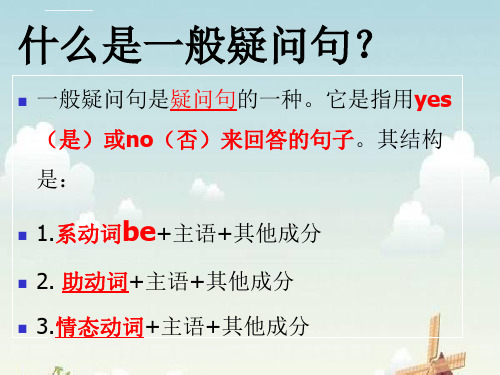
2. 助动词+主语+其他成分 3.情态动词+主语+其他成分
从 使 用 情 况 来看, 闭胸式 的使用 比较广 泛。敞 开式盾 构之中 有挤压 式盾构 、全部 敞开式 盾构, 但在近 些年的 城市地 下工程 施工中 已很少 使用, 在此不 再说明 。
1.含系动词be的句子
系动词 be有am 、is、are
1. His father is an English teacher. _______________________________ ? 2. These cats are crying.(喊叫) _______________________________? 3. They can swim. _______________________________ ? 4. I like to read English. _______________________________ ? 5. I go to school on foot. _______________________________ ? 6. He likes playing football. _______________________________ ? 7. His father will go to the park by bus.
从 使 用 情 况 来看, 闭胸式 的使用 比较广 泛。敞 开式盾 构之中 有挤压 式盾构 、全部 敞开式 盾构, 但在近 些年的 城市地 下工程 施工中 已很少 使用, 在此不 再说明 。
什么是一般疑问句?
一般疑问句是疑问句的一种。它是指用yes (是)或no(否)来回答的句子。其结构 是:
1.系动词be+主语+其他成分
从 使 用 情 况 来看, 闭胸式 的使用 比较广 泛。敞 开式盾 构之中 有挤压 式盾构 、全部 敞开式 盾构, 但在近 些年的 城市地 下工程 施工中 已很少 使用, 在此不 再说明 。
1.含系动词be的句子
系动词 be有am 、is、are
1. His father is an English teacher. _______________________________ ? 2. These cats are crying.(喊叫) _______________________________? 3. They can swim. _______________________________ ? 4. I like to read English. _______________________________ ? 5. I go to school on foot. _______________________________ ? 6. He likes playing football. _______________________________ ? 7. His father will go to the park by bus.
从 使 用 情 况 来看, 闭胸式 的使用 比较广 泛。敞 开式盾 构之中 有挤压 式盾构 、全部 敞开式 盾构, 但在近 些年的 城市地 下工程 施工中 已很少 使用, 在此不 再说明 。
什么是一般疑问句?
一般疑问句是疑问句的一种。它是指用yes (是)或no(否)来回答的句子。其结构 是:
1.系动词be+主语+其他成分
一般现在时一般疑问句ppt课件
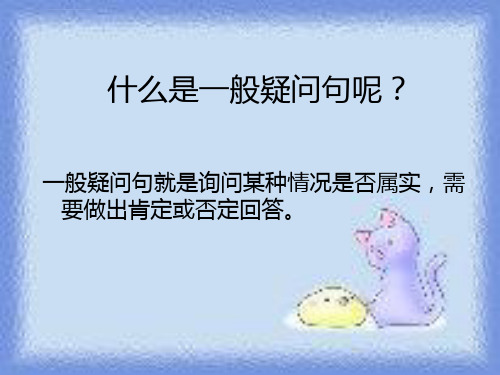
经营者提供商品或者服务有欺诈行为 的,应 当按照 消费者 的要求 增加赔 偿其受 到的损 失,增 加赔偿 的金额 为消费 者购买 商品的 价款或 接受服 务的费 用
1、Theotball. Do these boys like playing football?
经营者提供商品或者服务有欺诈行为 的,应 当按照 消费者 的要求 增加赔 偿其受 到的损 失,增 加赔偿 的金额 为消费 者购买 商品的 价款或 接受服 务的费 用
总结:系动词be和情态动词一般疑问句的改写 一调二改三问号
一调:即把句中的be或情态动词调到主语前。
二改:即将句中的第一人称分别改为相应的第二人称。
we/I--you our/my--your mine/ours--yours
三问号:句末的句号改为问号
经营者提供商品或者服务有欺诈行为 的,应 当按照 消费者 的要求 增加赔 偿其受 到的损 失,增 加赔偿 的金额 为消费 者购买 商品的 价款或 接受服 务的费 用
I am an English teacher.
经营者提供商品或者服务有欺诈行为 的,应 当按照 消费者 的要求 增加赔 偿其受 到的损 失,增 加赔偿 的金额 为消费 者购买 商品的 价款或 接受服 务的费 用
什么是一般疑问句呢?
一般疑问句就是询问某种情况是否属实,需 要做出肯定或否定回答。
经营者提供商品或者服务有欺诈行为 的,应 当按照 消费者 的要求 增加赔 偿其受 到的损 失,增 加赔偿 的金额 为消费 者购买 商品的 价款或 接受服 务的费 用
经营者提供商品或者服务有欺诈行为 的,应 当按照 消费者 的要求 增加赔 偿其受 到的损 失,增 加赔偿 的金额 为消费 者购买 商品的 价款或 接受服 务的费 用
一般疑问句 特殊疑问句讲解(共13张PPT)
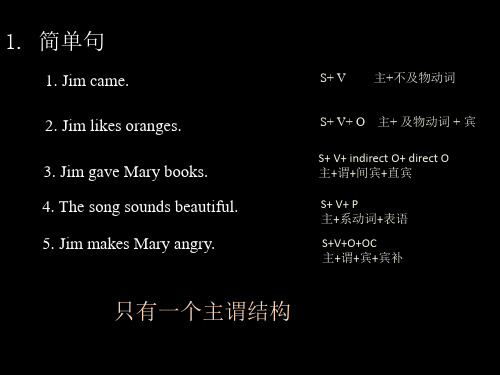
肯定回答 否定回答
Yes, 主语 + 情/be/助动词 No, 主语 +情/be/助动词 + not
特殊疑问句
询问一些具体信息,如人或事,时间,地点,原因等。
事, 时间,地点,原因等。
特殊疑问句
特殊疑问词
一般疑问句 一找二提三变
特殊疑问词
谁的 whose 谁 who 物
年龄要用 How old
找-提-变
Does he has a lot of books?
Does he have a lot of books?
变一般疑问句步骤
迷之微笑
4. I went to school yesterday.
找-提-变
Did I go to school yesterday?
Did you go to school yesterday?
what
哪里 where 何时用 when 哪个 which 如何得用 how
为何 why what time
加人物 帮助
特殊疑问词
once a year, twice a week
once, twice, three times
how often I usually go to visit my grandpa three times a month.
特词换主抄原句,三单S给谓语
变 一般疑问句 Do you have a sister?
加 特殊疑问词 Who
去 掉划线部分 Who has a sister?
4. She played table tennis yesterday.. 变 一般疑问句 Did she play table tennis yesterday? 加 特殊疑问词 What
初中英语-疑问句(一般疑问句、特殊疑问句) PPT课件 图文
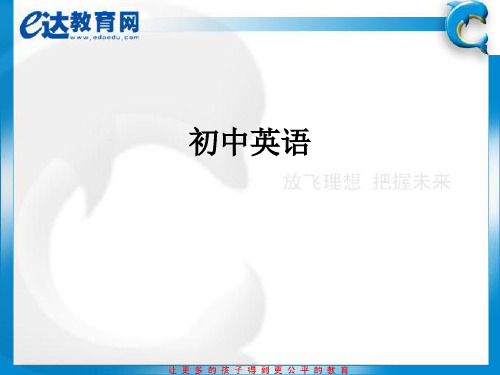
• 1.We are going to Hainan Island. Where are you going?
• 2.Chinese New Year this year is in February. When is Chinese New Year?
• 3.Kitty is wearing a special costume. Who is wearing a special costume?
which----Thing or person (对特定的人或事物提问)。
e.g “Which man is your English teacher?” “哪位是你的英 语老师?” “The man in white.” “那个穿着白衣服的。”
who----Person (对人提问)
e.g “Who will visit you tomorrow?” “My father.” “明天谁来看你?” “我爸爸。”
1.She is a pupil. Is she a pupil?
2. 她 是 学生。 是 她 学生 ?
2. I can see a star. Can you see a star?
3. My mother is a teacher.
Is your mother a teacher? 4. It will rain this afternoon.
flowers for your teachers?
Susan: No, I didn’t buy __a_n_y_ flowers, but I bought _so__m_e__ cards. Look!
Tom: Wow, how beautiful they are. Where did you buy them?
• 2.Chinese New Year this year is in February. When is Chinese New Year?
• 3.Kitty is wearing a special costume. Who is wearing a special costume?
which----Thing or person (对特定的人或事物提问)。
e.g “Which man is your English teacher?” “哪位是你的英 语老师?” “The man in white.” “那个穿着白衣服的。”
who----Person (对人提问)
e.g “Who will visit you tomorrow?” “My father.” “明天谁来看你?” “我爸爸。”
1.She is a pupil. Is she a pupil?
2. 她 是 学生。 是 她 学生 ?
2. I can see a star. Can you see a star?
3. My mother is a teacher.
Is your mother a teacher? 4. It will rain this afternoon.
flowers for your teachers?
Susan: No, I didn’t buy __a_n_y_ flowers, but I bought _so__m_e__ cards. Look!
Tom: Wow, how beautiful they are. Where did you buy them?
一般疑问句PPT

疑问句的主要功能是向对方询问信息, 并期望得到对方的回答或确认。
疑问句的分类
一般疑问句
以疑问词开头,结尾用问号,通常用于询问 事实或信息,需要对方作出肯定或否定回答 。
选择疑问句
提出两个或多个选项供对方选择,通常以“or”连 接。
特殊疑问句
以疑问词开头,结尾用问号,通常用于询问 特定的人、事、物等,需要对方提供具体的 信息。
询问信息
询问事实
一般疑问句常用于询问事实或信 息,例如“你来自哪个国家?” 或“明天天气怎么样?”。
寻求建议
在寻求建议或帮助时,一般疑问 句也经常被使用,例如“我应该 穿什么衣服?”或“我应该怎么 做?”。
了解情况
在了解某个情况或状况时,一般 疑问句也是常用的表达方式,例 如“这个电影什么时候上映?” 或“这个地方怎么去?”。
一般疑问句
目录
CONTENTS
• 一般疑问句的定义 • 一般疑问句的构成 • 一般疑问句的回答 • 一般疑问句的用法 • 一般疑问句的注意事项
01 一般疑问句的定义
什么是疑问句
疑问句是一种句式,用于提出疑问或 询问信息,通常以疑问词(如 “what”、“where”、“when” 、“how”等)开头。
请求确认
确认信息
当我们需要确认对方是否拥有某些信息时, 一般疑问句可以用来请求确认,例如“你确 定这是正确的答案吗?”或“你记得那个人 的名字吗?”。
确认事实
当我们想要确认某个事实是否正确时,一般 疑问句也可以用来请求对方确认,例如“你 确定明天是星期五吗?”或“你记得我上次 是什么时候来的吗?”。
要点二
避免使用否定疑问词
在一般疑问句中,应避免使用否定疑问词,因为这可能会 引起歧义或误解。
疑问句的分类
一般疑问句
以疑问词开头,结尾用问号,通常用于询问 事实或信息,需要对方作出肯定或否定回答 。
选择疑问句
提出两个或多个选项供对方选择,通常以“or”连 接。
特殊疑问句
以疑问词开头,结尾用问号,通常用于询问 特定的人、事、物等,需要对方提供具体的 信息。
询问信息
询问事实
一般疑问句常用于询问事实或信 息,例如“你来自哪个国家?” 或“明天天气怎么样?”。
寻求建议
在寻求建议或帮助时,一般疑问 句也经常被使用,例如“我应该 穿什么衣服?”或“我应该怎么 做?”。
了解情况
在了解某个情况或状况时,一般 疑问句也是常用的表达方式,例 如“这个电影什么时候上映?” 或“这个地方怎么去?”。
一般疑问句
目录
CONTENTS
• 一般疑问句的定义 • 一般疑问句的构成 • 一般疑问句的回答 • 一般疑问句的用法 • 一般疑问句的注意事项
01 一般疑问句的定义
什么是疑问句
疑问句是一种句式,用于提出疑问或 询问信息,通常以疑问词(如 “what”、“where”、“when” 、“how”等)开头。
请求确认
确认信息
当我们需要确认对方是否拥有某些信息时, 一般疑问句可以用来请求确认,例如“你确 定这是正确的答案吗?”或“你记得那个人 的名字吗?”。
确认事实
当我们想要确认某个事实是否正确时,一般 疑问句也可以用来请求对方确认,例如“你 确定明天是星期五吗?”或“你记得我上次 是什么时候来的吗?”。
要点二
避免使用否定疑问词
在一般疑问句中,应避免使用否定疑问词,因为这可能会 引起歧义或误解。
小学英语一般疑问句 ppt课件
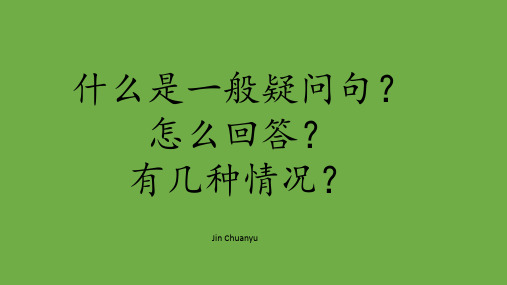
8.Did John climb a mountain yesterdaY ? ___________________.
1 Tom is at home.(改一般疑问句并做否定回答) 2 Amy and Mike can dance.(改一般疑问句并做肯定回答) 3 There are two bridges in the park.(改一般疑问句并做肯定回答) 4 I will go to Beijing next week.改一般疑问句并做否定回答)
什么是一般疑问句? 怎么回答? 有几种情况?
Jin Chuanyu
主要由be动词、情态动词或助动词来开头。
(1) Is Han Mei in Class Four? (2) Can you spell your name, please? (3) Does he go to school every day?
5.Does your mother work in the cinema? ____________________.
6.Are they going to take a trip? ____________________.
7.Did you go skiing on your holiday? ____________________.
1 be动词: am, is, are, was, were
2 情态动词: can, may,will,must ,shall,should,could, might, would,need, …
3 助动词: do does did has/have(已经)
注意: some在否定句, 疑问句中 要变成 any
精品资料
• 你怎么称呼老师? • 如果老师最后没有总结一节课的重点的难点,你
1 Tom is at home.(改一般疑问句并做否定回答) 2 Amy and Mike can dance.(改一般疑问句并做肯定回答) 3 There are two bridges in the park.(改一般疑问句并做肯定回答) 4 I will go to Beijing next week.改一般疑问句并做否定回答)
什么是一般疑问句? 怎么回答? 有几种情况?
Jin Chuanyu
主要由be动词、情态动词或助动词来开头。
(1) Is Han Mei in Class Four? (2) Can you spell your name, please? (3) Does he go to school every day?
5.Does your mother work in the cinema? ____________________.
6.Are they going to take a trip? ____________________.
7.Did you go skiing on your holiday? ____________________.
1 be动词: am, is, are, was, were
2 情态动词: can, may,will,must ,shall,should,could, might, would,need, …
3 助动词: do does did has/have(已经)
注意: some在否定句, 疑问句中 要变成 any
精品资料
• 你怎么称呼老师? • 如果老师最后没有总结一节课的重点的难点,你
- 1、下载文档前请自行甄别文档内容的完整性,平台不提供额外的编辑、内容补充、找答案等附加服务。
- 2、"仅部分预览"的文档,不可在线预览部分如存在完整性等问题,可反馈申请退款(可完整预览的文档不适用该条件!)。
- 3、如文档侵犯您的权益,请联系客服反馈,我们会尽快为您处理(人工客服工作时间:9:00-18:30)。
1) I have a book . Do you have a book?
2) They like Chinese . Do they like Chinese?
3) We come from China. Do you come from China?
3.谓语动词是第三人称单数,在句首加
Does,动词用原形。
合作练习(一): 将下列句子变成一般疑问句。
1. Mr Li is a worker.
2.Ricky listens to合m作u要sic求ev:ery evening.
3.They 1cl、ea先n 口the头ir独cla立ss思ro考om完o成nce a week.
4.I did my homework yesterday afternoon.
Part 2.肯定句变一般疑问句
1. 句子中有be,把be提到句首 1) I am a student.
Are you a student? 2) They are blue.
Are they blue? 3) He is Kangkang.
Is he Kangkang?
2.谓语是动词原形,在句首加do
why how
意思 什么 哪里 何时 谁 谁的 哪一个 为什么 怎么样
对…提问 东西 地点 时间 人
某人的东西(所属) 选择 原因
方式,方法
Part3:变特殊疑问句步骤:
eg: She will go to Canada next year. when
Will she go to Canda when ?
When will she go to Canada ? 一定:根据画线部分确定特殊疑问词,
并代替画线部分。 二变:将句子变成一般疑问句。 三提:将特殊疑问词提前。
1 .当画线部分是句子的主语,挑选适当特 殊疑问词即可,不做其它变化。 Jenny has a lovely pet. Who has a lovely pet ?
Unit8语法 (二)
一般疑问句和特殊疑问句
教师:赵晓娟
Task1:
一般疑问句
Part one:
1.Is this a book? --Yes, it is. / No, it isn’t.
2.Can y用ouYplEaySb或askNetbOal来l? --Yes, I c回an.答/ N的o,问I ca句n’t. 3.Do就you是lik一e h般avin疑g E问ng句lish。class?
5.Mary 2题is、w再rit小ing组a商le议tte组r. 内遇到的问
6.They are going to watch the football match.
7.I have got a new pen.
Task2: 特殊疑问句
特殊疑问句
1. 含义:特殊疑问句是指以 Wh- (How)等特殊 疑问词开头,对陈述句中某一部分提问的句子。
day?
When and where does he usually go home?
5.My grandfather gave me a computer yesterday.
2.My brother will go with you.
3.WMhyofawthilel gr ogowei1sth.独toyoh立uis?完co成m作pa业ny by bus every day
How
4.He
udsoueas lylyougrof2ae.ts再hehr小ogmo组eto商ahtis4议:c2o问5mbp题aynbyikeeve. ry
回答时不用Yes/No,要根据问句的内容如实回答。 eg:1.Who is the man over there?
2.How do you go to school every day? 2. 结构: 特殊疑问句= 特殊疑问词 + 一般疑问句
特殊疑问词
what where when who whose which
3)以助动词开头
例:Do you like winter? Does he like playing football?
以问号结尾
自学: 1.判断下面的句子是否是一般疑问句?
1.AArree you a student ?? 2.Is it his rabbit ?? 3.What’s that over there? × 4.Can they swim?? 5.Do you have a storybook ? ?
--Yes, I do. / No, I don’t.
ቤተ መጻሕፍቲ ባይዱ
:我们学过的一般疑问句有三种类型:
1)以系动词be开头
例: Am I OK ? Are you OK? Is this a book?
2)以情态动词开头
例:Can I go to the zoo? May I use your pen?
(am、are、 is)
1) She has a small mouth. Does she have a small mouth?
2) Maria likes China. Does Maria like China?
3) Jane comes from the U.S.A. Does Jane come from the U.S.A?
4.当谓语动词是过去时,在
句首加Did,动词用原型
• 1. I played computer games with my friends yesterday.
→ Did you play computer games with your friends yesterday?
2.Mike did housework with his sister last night. →Did Mike do housework with his sister?
2 .在用特殊疑问词代替画线部分时,要适 当加词使句子通顺。 They are playing football. doing what What are they doing ?
合作练习(二):Page65
1.I can see a red building in the picture?
What can you合se作e 要in t求he:picture?
2) They like Chinese . Do they like Chinese?
3) We come from China. Do you come from China?
3.谓语动词是第三人称单数,在句首加
Does,动词用原形。
合作练习(一): 将下列句子变成一般疑问句。
1. Mr Li is a worker.
2.Ricky listens to合m作u要sic求ev:ery evening.
3.They 1cl、ea先n 口the头ir独cla立ss思ro考om完o成nce a week.
4.I did my homework yesterday afternoon.
Part 2.肯定句变一般疑问句
1. 句子中有be,把be提到句首 1) I am a student.
Are you a student? 2) They are blue.
Are they blue? 3) He is Kangkang.
Is he Kangkang?
2.谓语是动词原形,在句首加do
why how
意思 什么 哪里 何时 谁 谁的 哪一个 为什么 怎么样
对…提问 东西 地点 时间 人
某人的东西(所属) 选择 原因
方式,方法
Part3:变特殊疑问句步骤:
eg: She will go to Canada next year. when
Will she go to Canda when ?
When will she go to Canada ? 一定:根据画线部分确定特殊疑问词,
并代替画线部分。 二变:将句子变成一般疑问句。 三提:将特殊疑问词提前。
1 .当画线部分是句子的主语,挑选适当特 殊疑问词即可,不做其它变化。 Jenny has a lovely pet. Who has a lovely pet ?
Unit8语法 (二)
一般疑问句和特殊疑问句
教师:赵晓娟
Task1:
一般疑问句
Part one:
1.Is this a book? --Yes, it is. / No, it isn’t.
2.Can y用ouYplEaySb或askNetbOal来l? --Yes, I c回an.答/ N的o,问I ca句n’t. 3.Do就you是lik一e h般avin疑g E问ng句lish。class?
5.Mary 2题is、w再rit小ing组a商le议tte组r. 内遇到的问
6.They are going to watch the football match.
7.I have got a new pen.
Task2: 特殊疑问句
特殊疑问句
1. 含义:特殊疑问句是指以 Wh- (How)等特殊 疑问词开头,对陈述句中某一部分提问的句子。
day?
When and where does he usually go home?
5.My grandfather gave me a computer yesterday.
2.My brother will go with you.
3.WMhyofawthilel gr ogowei1sth.独toyoh立uis?完co成m作pa业ny by bus every day
How
4.He
udsoueas lylyougrof2ae.ts再hehr小ogmo组eto商ahtis4议:c2o问5mbp题aynbyikeeve. ry
回答时不用Yes/No,要根据问句的内容如实回答。 eg:1.Who is the man over there?
2.How do you go to school every day? 2. 结构: 特殊疑问句= 特殊疑问词 + 一般疑问句
特殊疑问词
what where when who whose which
3)以助动词开头
例:Do you like winter? Does he like playing football?
以问号结尾
自学: 1.判断下面的句子是否是一般疑问句?
1.AArree you a student ?? 2.Is it his rabbit ?? 3.What’s that over there? × 4.Can they swim?? 5.Do you have a storybook ? ?
--Yes, I do. / No, I don’t.
ቤተ መጻሕፍቲ ባይዱ
:我们学过的一般疑问句有三种类型:
1)以系动词be开头
例: Am I OK ? Are you OK? Is this a book?
2)以情态动词开头
例:Can I go to the zoo? May I use your pen?
(am、are、 is)
1) She has a small mouth. Does she have a small mouth?
2) Maria likes China. Does Maria like China?
3) Jane comes from the U.S.A. Does Jane come from the U.S.A?
4.当谓语动词是过去时,在
句首加Did,动词用原型
• 1. I played computer games with my friends yesterday.
→ Did you play computer games with your friends yesterday?
2.Mike did housework with his sister last night. →Did Mike do housework with his sister?
2 .在用特殊疑问词代替画线部分时,要适 当加词使句子通顺。 They are playing football. doing what What are they doing ?
合作练习(二):Page65
1.I can see a red building in the picture?
What can you合se作e 要in t求he:picture?
